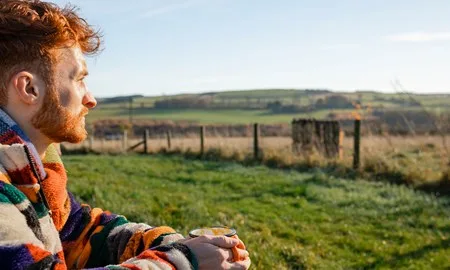Published on 1st February 2023
Local Insights
Tackling taboos around mental health

The agriculture industry has become more open about mental health in recent years, but it remains a topic many farmers are stoically reluctant to talk about.
Tackling taboos around mental health Content
Mental Health in the Industry
The agriculture industry has become more open about mental health in recent years, but it remains a topic many farmers are stoically reluctant to talk about. Yet, the challenges have never been greater, whether from soaring costs, extreme weather, the loss of BPS, political events, market and supply chain uncertainty, labour shortages, or new disease outbreaks. Rural isolation and long working hours often exacerbate issues such as stress, anxiety or depression.
Indeed, the latest annual survey of 450 farmers by the Farm Safety Foundation (Yellow Wellies) reveals anxiety has increased in the past eight years, with 94% of young farmers (under 40) and 84% of over-40s believing mental health is the biggest hidden problem they face. The vast majority also recognise the direct link between mental health and farm safety.
Questioning of more than 15,000 farmers for RABI in 2020/21 also found 47% of the farming community were experiencing some form of anxiety.
“You are your farm’s biggest asset,” says FSF’s Stephanie Berkeley.
“Farmers are great at caring for crops, machinery or livestock, but need to look after their physical and mental wellbeing too.
“It’s really encouraging more people and organisations are talking about mental health. We can all play a part in identifying the signs and symptoms when someone might be struggling.”
The Farming Community Network’s Alex Phillimore agrees. “None of us are impervious to mental ill health. We need to view it like physical health; if you notice a change, get it checked.”
He acknowledges it is often an “invisible illness” that is hard to self- diagnose, but there are usually signs others may spot first, including:
• Becoming more withdrawn or distant – avoiding social engagement
• Increasing irritability and mood swings
• Difficulty sleeping, or sleeping more
• Forgetfulness (particularly dangerous on farms)
• Indecisiveness
• Dietary changes – eating more, or less
• Changes to physical state e.g. frequent headaches, stomach problems, muscle tension, lack of sex drive.
“One question I ask farmers is this; If you’re having a really bad day, would you talk about it? Quite often, male farmers in particular, just persevere and get on with it.
“That’s the mentality we need to change. Yes, farmers need resilience, but if you’re struggling, then keeping it to yourself and bottling things up is not good. It increases the likelihood of ‘burn- out’ or being overwhelmed as things pile up. The sooner you address an issue, the sooner you can work to resolve it.
“The industry must normalise conversations around mental health. There’s strength in admitting you’re struggling and seeking help to address it. Often, just telling someone can really help. A problem shared is a problem halved.”
Case study
Emily Davies
Emily’s story
When farmer’s daughter Emily Davies discovered the 250-acre family farm was going to be compulsorily purchased by the government for a major infrastructure project, she, like her family, was devastated.
The dairy and arable farm had been in the family for more than 100 years, and had always been the place the younger generation thought they would one day take on, Emily included.
“We found out in 2010, via a BBC News article, and I clearly remember the moment Dad called to tell me. Our farm was bought by my great grandfather and had been owned by our family ever since.
“It’s all we’ve ever known and has shaped my identity and personality. To have that suddenly taken away is huge and leaves you thinking what am I now?”
A decade trying to fight the decision took its toll on the family, particularly Emily and her Mum, who both suffered worsening depression caused by the stress, sense of loss and helplessness. This was exacerbated by the lockdown in 2020, and at one point left her Mum feeling suicidal. Emily tried to offer support, but found herself struggling to cope too.
“I didn’t want to get up in the mornings, couldn’t be bothered to dress properly, put on weight, suffered several panic attacks, and really started hibernating and hiding from people. My temperament also changed, becoming quite defensive and ratty with people.”
A friend suggested her parents contact FCN, which was a major turning point. FCN staff listened and understood the issues, and provided practical support, including helping to set up a meeting to finalise the last legalities connected with the compulsory purchase. This finally allowed her parents to move on and start building a new life elsewhere. Emily sought therapy too, and in May 2021 also volunteered with FCN.
“I wanted to give something back after they helped my family. I wanted to use my experience to be part of the solution, helping other farmers that may have to go through similar things. Volunteering has been part of my healing process too, alongside singing and self-learning about human psychology.”
She recognises the importance of sharing problems with someone, whether a therapist, organisation like FCN, or a close friend or family member. “Don’t suffer in silence. One of the key people for me has been my husband; involving him, and making him aware of my mental state has really helped me through this.
“Not telling anyone makes it a real struggle to get back to full health.”
This article is an extract from CropFocus magazine, if you would like to sign up for the next issue please sign up here


